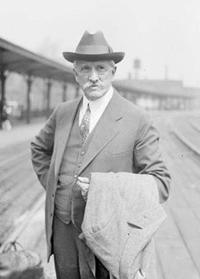A Quote by Peter Hammill
I had then and still retain an interest in science for its own sake and as a metaphor for our current lives.
Related Quotes
We who are living in the west today are fortunate. Freedom has been bequeathed to us. We have not had to carve it out of nothing; we have not had to pay for it with our lives. But it would be a grave mistake to think that freedom requires nothing of us. Each of us has to earn freedom anew in order to possess it. We do so not just for our own sake, but for the sake of our children, so that they may build a better future that will sustain over the world the responsibilities and blessings of freedom.
In the field of Egyptian mathematics Professor Karpinski of the University of Michigan has long insisted that surviving mathematical papyri clearly demonstrate the Egyptians' scientific interest in pure mathematics for its own sake. I have now no doubt that Professor Karpinski is right, for the evidence of interest in pure science, as such, is perfectly conclusive in the Edwin Smith Surgical Papyrus.
What makes us leave what we love best? What is it inside us that keeps erasing itself When we need it most, That sends us into uncertainty for its own sake And holds us flush there until we begin to love it And have to begin again? What is it within our own lives we decline to live Whenever we find it, making our days unendurable, And nights almost visionless? I still don't know yet, but I do it.
Aside from higher considerations, charity often operates as a vastly wise and prudent principle-a great safeguard to its possessor. Men have committed murder for jealousy's sake, and anger's sake, and hatred's sake, and selfishness' sake, and spiritual pride's sake; but no man that ever I heard of, ever committed a diabolical murder for sweet charity's sake. Mere self-interest, then, if no better motive can be enlisted, should, especially with high-tempered men, prompt all beings to charity and philanthropy.
But weightier still are the contentment which comes from work well done, the sense of the value of science for its own sake, insatiable curiosity, and, above all, the pleasure of masterly performance and of the chase. These are the effective forces which move the scientist. The first condition for the progress of science is to bring them into play.
When grown-up persons indulge in practical jokes, the fact gauges them. They have lived narrow, obscure, and ignorant lives, and at full manhood they still retain and cherish a job lot of left-over standards and ideals that would have been discarded with their boyhood if they had then moved out into the world and a broader life.
Our belief is not a belief. Our principles are not a faith. We do not rely soley upon science and reason, because these are necessary rather than sufficient factors, but we distrust anything that contradicts science or outrages reason. We may differ on many things, but what we respect is free inquiry, openmindedness, and the pursuit of ideas for their own sake.
In college, I was a painter, and I had a strong interest in fashion. I just like this concept of being able to dream something, materialize it, play with it and design it for the sake of someone else and for the sake of the joy in your own heart. So it's kind of like art that you're unattached to. It's art that you give away freely and I liked that about fashion.




































